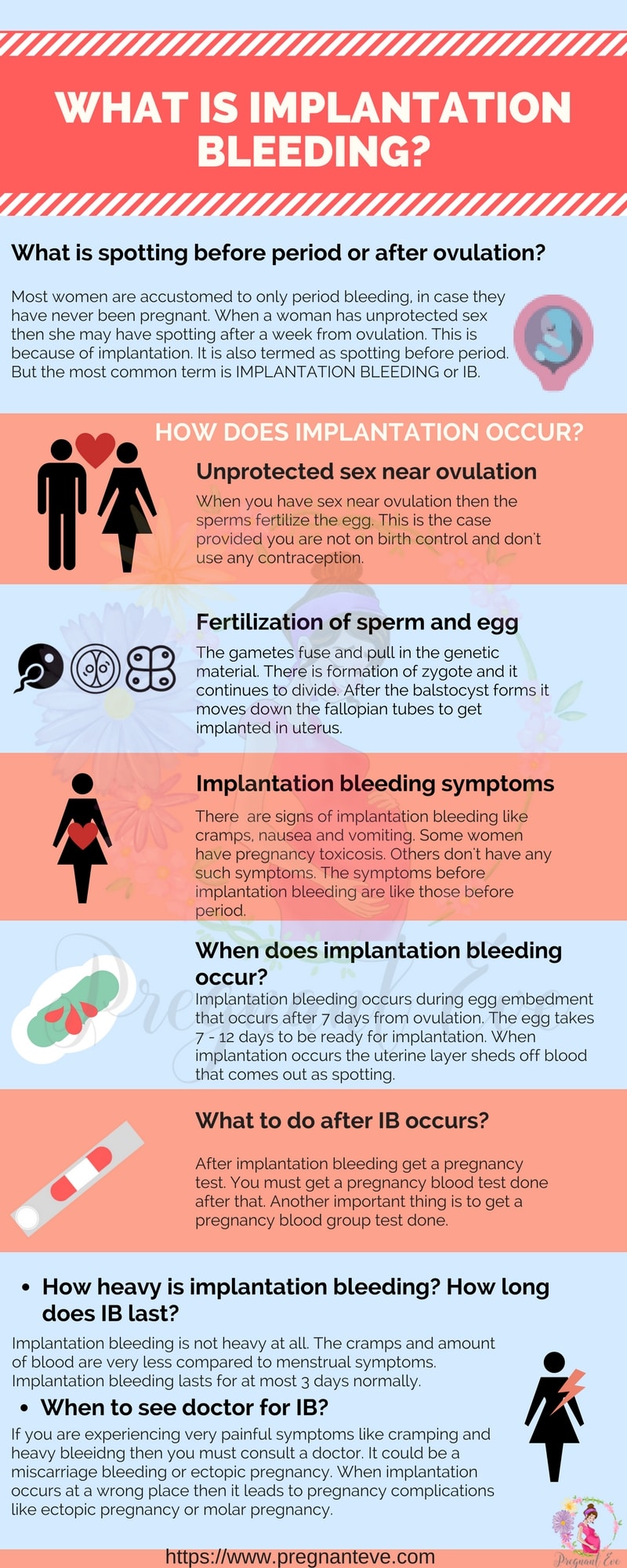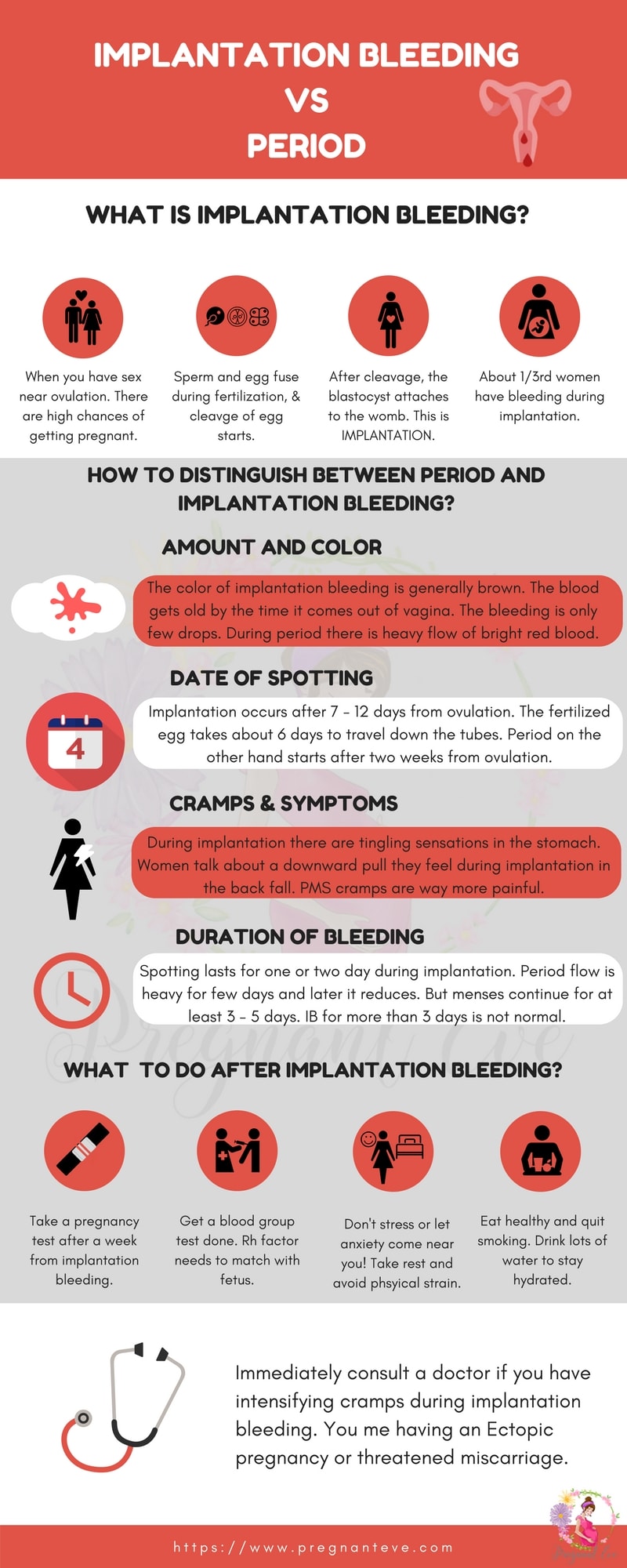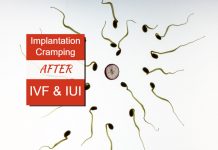If you are trying to conceive and reading up about pregnancy, I am sure you must have heard a lot about Implantation. Still, many of us aren’t aware of all the implantation facts.
Women who are trying to get pregnant must know about implantation facts more than anything else. Most women fail to recognize implantation bleeding from period.
After reading this article, you’ll be able to differentiate the two. Implantation is the most crucial and critical early pregnancy event. If it goes wrong, there is very little or almost no chance that you will have a healthy pregnancy.
Implantation bleeding is often confused with menses, but there are many differences between them.

Top 25 Implantation Facts you wish you knew earlier
Despite being such an important event, implantation is very rapid. Before implantation, a woman is only chemically pregnant.
There is an early pregnancy factor in a pregnant woman’s blood serum after fertilization. However, all other hormones are still not enough.
Only after successful implantation, the pregnancy hormones start surging. It happens under the influence of hCG hormone that starts forming after implantation.
That’s the reason why you cannot take a home pregnancy test before implantation. Until the hormone hCG is present in your urine, the test will give false negative pregnancy test.
Implantation is not painful and is for the attachment of egg to the wall of the womb. Egg embedment is essential for meeting the needs of nutrition, excretion, and oxygen supply to the developing embryo.
Implantation occurs before period due date. Pregnancy tests that claim to detect pregnancy before period do so because implantation happens before it.
After ovulation, conception occurs within 24 hours and about 7-12 days later implantation happens.
1) Implantation leads to pregnancy contrary to the belief that sex leads to pregnancy
If sex led to pregnancy always then after every unprotected sex you’d get a positive pregnancy test. Implantation leads to pregnancy. Even a fertilized egg can go out as very early miscarriage camouflaged as period.
Most women will never come to know about it. After implantation and acceptance of blastocyst by the body, the chances of pregnancy’s survival increase. The mother’s body in earlier stages recognizes the zygote as a foreign body.
This is the reason why it produces Rh negative antibodies if there is blood group mismatch.
What can you do after implantation? You must get a blood group test and a pregnancy blood test. Avoid any stress. Cut down caffeine intake and quit smoking and alcohol.
2) Implantation is a rapid process and takes only 48 hours
As mentioned earlier implantation is a fast process. It involves only a 64 cells mass that has to sink in the layers of the uterus.
Implantation bleeding and cramps go unnoticed because they happen so quickly. The first stage of implantation takes about 12 hours for the blastocyst to move in the upper layer of the uterus.
Later on, the blastocyst moves further inside and extends villi for obtaining nutrients.
3) Implantation is a two-stage process
Implantation despite being a single term is a two-stage process. In the first stage, the fertilized dividing egg guided by the Zona Pellucida reaches the uterus.
The trophoblast fibers are like small needless in the wall of the blastocyst. These fibers prick the endometrial lining and cause secretions to exude allowing the 64 celled structure to move inside the layer of the uterus.
After this, the lining glands secrete factors that permit the embryo to move forward. Once it reaches the inner layer, it extends many fingers like protections around. These are the villi that will help embryo obtain food and water from mother’s body.
4) Implantation at a wrong site can never allow a healthy pregnancy to follow
Implantation is specific and needs to be at a particular location. If implantation occurs in Fallopian tubes, then it can lead to bursting of them.
Implantation needs to be at the right place, and only then pregnancy follows a normal path. Any fault in implantation creates a series of defects in pregnancy.
5) Implantation is the first step in placenta formation
After implantation, the amnion and chorion start forming the placenta. The placenta begins producing hCG. This hormone further controls the other hormones.
6) The stage at which implantation occurs is blastocyst with only 64 cells
Implantation bleeding is not heavy is because it involves implantation of a 64 celled structure in the walls. It can just cause scanty spotting and nothing more. The fertilized egg travels down the tubes while dividing. When it is of 64 smaller units, it implants in the wall.
7) The egg membrane ‘Zona Pellucida’ persists until successful implantation
The egg membrane (Zona Pellucida) that exists from the pre-fertilization stage doesn’t shed off until implantation. It has fibers that pierce the uterine lining.
Zona Pellucida has a layer of structures that prevent entry of sperms. Sperm dissolves this layer and fertilizes the egg. Later the layer guides the egg to the site of implantation.
8) Super early pregnancy test by EPF (Early Pregnancy Factor) can detect pregnancy before implantation
After fertilization, Early pregnancy Factor releases in the blood of a woman. Pregnancy can be identified by checking for this factor, but the accuracy rate is only 88.8%. Pregnancy detection by super early pregnancy test before implantation use this factor.
Using this method, pregnancy can be detected within 48 hours after sex. Certain pre-implantation events can lead to pregnancy loss.
Therefore, the False positive pregnancy test rate is high in this method. Hence, tests using hCG are preferred.
9) Implantation bleeding is a misnomer, and it only results in spotting
Implantation involves just a small bunch of cells. They only cause is slight rubbing and compressing of the blood vessels. Implantation bleeding never actually occurs.
It mostly goes off as spotting or vaginal discharge with blood. Women don’t even need a liner for implantation spotting.
10) Most women are not able to feel implantation
Implantation is so mild that most women never come to know about it. Only after symptoms of implantation turn into early pregnancy signs, women take a pregnancy test. This is the first time they come to know about their pregnancy. Implantation despite being so crucial does not lead to any major symptoms.
11) Implantation inside the tubes leads to a fatal condition called Tubal Pregnancy
If the woman has any anatomical problems like tube blockages or scars, then Implantation occurs inside the tubes. There are unbearable cramps and heavy bleeding. Soon the tubal pregnancy ends in miscarriage. Implantation at any place other than uterus leads to a nonviable pregnancy.
12) The steps before implantation can take 7-12 days
Implantation itself takes only a few hours. But the sperm can be in the vagina for around 5 days. They travel through the vagina and up to the ampullary isthmus junction where fertilization of egg and sperm occurs.
Implantation occurs between 7-12 days after conception is because this is how much time it takes for pre-implantation events to unfold. The first division after fertilization takes around two days.
13) Implantation cramps are mild and never cause unbearable pain
PMS cramps are something women embrace as a monthly ritual. Implantation cramps though critical for the onset of pregnancy don’t cause any pain. Most women never come to know when they had implantation is because the cramps are mild.
14) Implantation defects can cause a reduction in fertility for future pregnancies
In case of Ectopic pregnancy, surgery is required at the later stages. At an earlier stage, a tubal pregnancy is treated by using methotrexate. Surgery at a later stage can require removal of the tube and the ovary reducing the number of eggs available. Naturally, it will affect the fertility of the woman.
15) Stress and anxiety can affect implantation process
During implantation, a lot of factors release in the body. If a woman is under stress, her suppressed immune system will not be able to fight any illness.
Further, it will lead to her catching some infection. All this will tax the body and can lead to implantation failure. During implantation, you need to relax and stay healthy.
16) Most early miscarriages are because of implantation failures
Many women have a primitive miscarriage in their lifetime. They take it as a late period, but it is an early pregnancy miscarriage. A miscarriage is heavy bleeding that lasts for about ten days.
Chromosomal abnormalities and implantation failure are primary reasons for early miscarriages. In fact, chromosomal defects cause the mother’s body to reject the newly implanted egg.
17) A home pregnancy test is most accurate after implantation signs are visible
Only after implantation, the production of hCG picks up. The pregnancy hormone doubles every 48-72 hours and rises in concentration. After implantation signs are evident pregnancy test accuracy is more reliable. It is best to wait for a week after implantation to take a pregnancy test.
It will reduce the chances of getting a false negative pregnancy test. Early pregnancy tests make it possible to take a pregnancy test after implantation. As implantation occurs before period, a pregnancy test can be carried before period.
18) Any scars from previous surgery or C Section can affect implantation
Scars, fibroids, and polyps can affect implantation. They block the natural pathway of the egg thus preventing correct implantation. That’s why a natural delivery is preferred.
19) Symptoms after implantation are early signs of pregnancy
The after symptoms of implantation are nothing but early pregnancy signs. After implantation, your basal body temperature goes up which is a sign of pregnancy. This must happen after implantation dip of BBT.
Most women perceive implantation signs as PMS. There are slight differences between the two.
20) Implantation bleeding can be orange, brown, dark red and even pink
Depending upon the state of cervical mucus the color of implantation bleeding varies. If the bleeding is bright red, it is a sign that there are active bleeding regions in the uterus. Brown implantation bleeding is a sign that the blood is old.
Orange implantation spotting is due to cervical infections.
21) Implantation mostly occurs on the back wall of the uterus
The back of uterus wall is thick and has more blood vessels. Implantation mostly occurs in the rear wall of the uterus for better support and nourishment of the embryo.
22) Immunity reduces during implantation
The blastocyst before implantation releases many factors that reduce the immunity of mother. This makes her more prone to diseases.
The endometrial lining becomes more richly supplied with blood vessels. The rising progesterone causes dilation of the uterus to accept the zygote.
23) Late embedment can delay pregnancy detection by one month
If a woman has late implantation near her period, she might not miss a period. She will come to know about her pregnancy from the missed period after one month.
24) Egg embedment lasts from 1st week until the 20th week
Egg embedment starts in the 1st week but continues until the 20th week. After 20th week the placenta alone supports the fetus.
This is why implantation is the most important step of pregnancy.
25) Gynaecologists count implantation as 3 weeks of pregnancy
Women tend to take the pregnancy test after the missed period. She might count her pregnancy from the day of missed period. But even if chemically, pregnancy occurred after fertilization. Thus gynaecologist times your pregnancy adding three weeks to it.






![Implantation Bleeding With Twins [How long does IB last with twins?] Implantation Bleeding With Twins](https://www.pregnanteve.com/wp-content/uploads/2019/01/implantation-bleeding-with-twins-218x150.jpg)





If I felt implantation around the 25,26 of April when did I most likely get pregnant.. I’m not understanding the implantation?
A week and few days before implantation you must have got pregnant. Depending on your cycle length.
I bled 10 days into icsi ivf 2 embryos but it was only for a day and half couldi be pregnat? My boobs have gone swollen again also.
Positive pregnancy test after IVF can be because of the treatment. Take a test at the doctor’s. Can’t say whether pregnancy has occurred without any tests.
had sex on the 24th 10 days later i started to bleed /spotting wasnt heavy at all and im n the 4th day and its very light pink light not that noticable could i be pregnant never had this before ever usually my periods are very heavy then goes lighter but this seems different i got sick in two days too i dunno how long can implation lasts for ?? please help im 30 yrs old too
Implantation lasts for only a day. Your symptoms do agree with what must occur during implantation. You can take a test after a few days.
We have sex during my ovulation day June 20 .. I’ve got bleeding on June 03. Its only 3 days then it stop. I don’t know ifits my period or implantation.
Hi Vanz, You can get answers to your questions from experts here: https://trk.justanswer.com/SHPU